Assessing the Limits: Freedom of Expression and Human Rights Act
VerifiedAdded on 2023/06/15
|12
|3813
|455
Essay
AI Summary
This essay delves into the complex debate surrounding freedom of expression and the necessity of placing limitations on this right. It examines arguments for and against unrestricted free speech, highlighting issues such as hate speech, the potential for inciting violence, and the abuse of online platforms. The discussion also considers the importance of protecting the rights of others and the ethical dimensions of freedom of expression, drawing on consequentialist theories and the Hegelian Dialectic. The essay concludes by emphasizing the need for a balanced approach that recognizes the value of free expression while safeguarding against its potential harms, find more solved assignments and past papers on Desklib.

Paraphrase This Document
Need a fresh take? Get an instant paraphrase of this document with our AI Paraphraser
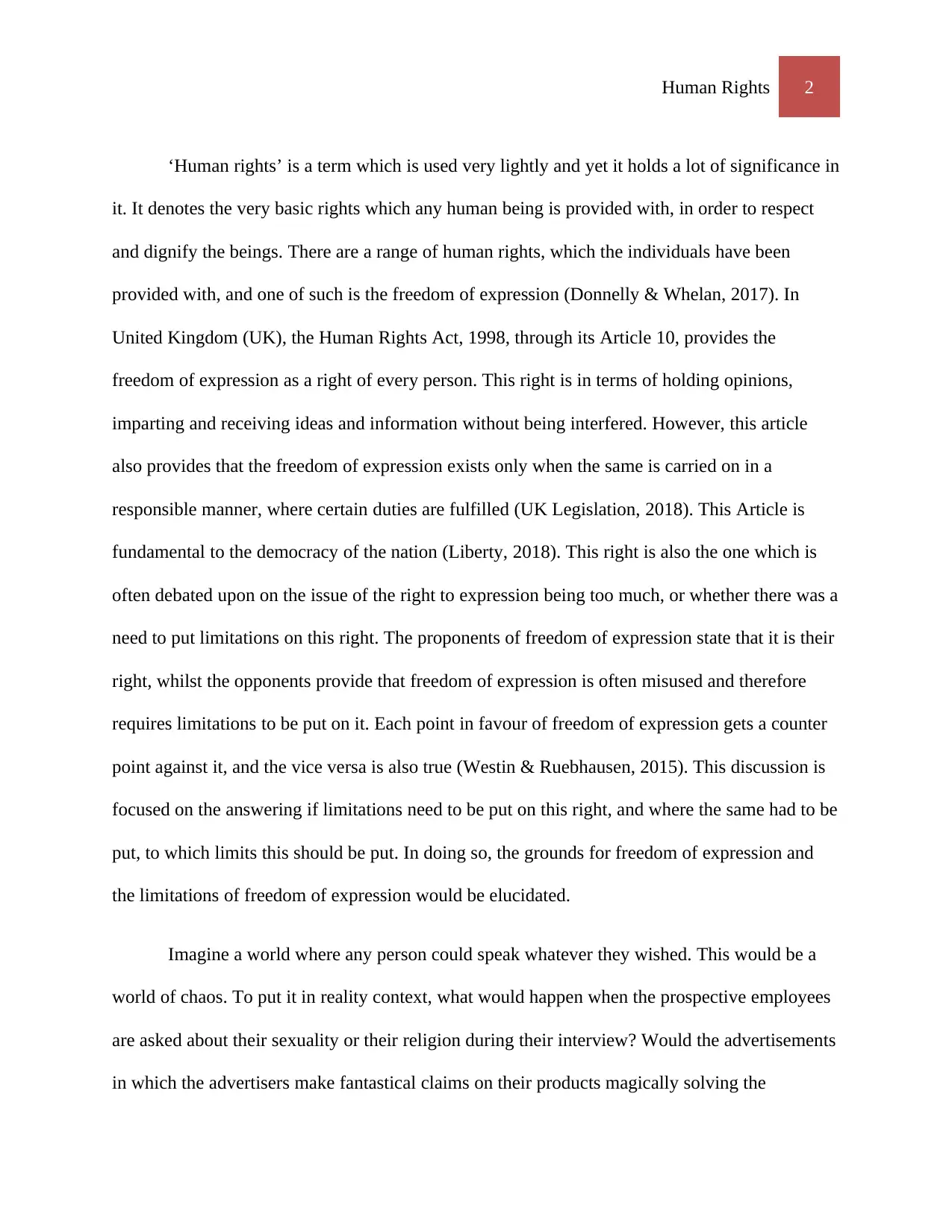
Human Rights 2
‘Human rights’ is a term which is used very lightly and yet it holds a lot of significance in
it. It denotes the very basic rights which any human being is provided with, in order to respect
and dignify the beings. There are a range of human rights, which the individuals have been
provided with, and one of such is the freedom of expression (Donnelly & Whelan, 2017). In
United Kingdom (UK), the Human Rights Act, 1998, through its Article 10, provides the
freedom of expression as a right of every person. This right is in terms of holding opinions,
imparting and receiving ideas and information without being interfered. However, this article
also provides that the freedom of expression exists only when the same is carried on in a
responsible manner, where certain duties are fulfilled (UK Legislation, 2018). This Article is
fundamental to the democracy of the nation (Liberty, 2018). This right is also the one which is
often debated upon on the issue of the right to expression being too much, or whether there was a
need to put limitations on this right. The proponents of freedom of expression state that it is their
right, whilst the opponents provide that freedom of expression is often misused and therefore
requires limitations to be put on it. Each point in favour of freedom of expression gets a counter
point against it, and the vice versa is also true (Westin & Ruebhausen, 2015). This discussion is
focused on the answering if limitations need to be put on this right, and where the same had to be
put, to which limits this should be put. In doing so, the grounds for freedom of expression and
the limitations of freedom of expression would be elucidated.
Imagine a world where any person could speak whatever they wished. This would be a
world of chaos. To put it in reality context, what would happen when the prospective employees
are asked about their sexuality or their religion during their interview? Would the advertisements
in which the advertisers make fantastical claims on their products magically solving the
‘Human rights’ is a term which is used very lightly and yet it holds a lot of significance in
it. It denotes the very basic rights which any human being is provided with, in order to respect
and dignify the beings. There are a range of human rights, which the individuals have been
provided with, and one of such is the freedom of expression (Donnelly & Whelan, 2017). In
United Kingdom (UK), the Human Rights Act, 1998, through its Article 10, provides the
freedom of expression as a right of every person. This right is in terms of holding opinions,
imparting and receiving ideas and information without being interfered. However, this article
also provides that the freedom of expression exists only when the same is carried on in a
responsible manner, where certain duties are fulfilled (UK Legislation, 2018). This Article is
fundamental to the democracy of the nation (Liberty, 2018). This right is also the one which is
often debated upon on the issue of the right to expression being too much, or whether there was a
need to put limitations on this right. The proponents of freedom of expression state that it is their
right, whilst the opponents provide that freedom of expression is often misused and therefore
requires limitations to be put on it. Each point in favour of freedom of expression gets a counter
point against it, and the vice versa is also true (Westin & Ruebhausen, 2015). This discussion is
focused on the answering if limitations need to be put on this right, and where the same had to be
put, to which limits this should be put. In doing so, the grounds for freedom of expression and
the limitations of freedom of expression would be elucidated.
Imagine a world where any person could speak whatever they wished. This would be a
world of chaos. To put it in reality context, what would happen when the prospective employees
are asked about their sexuality or their religion during their interview? Would the advertisements
in which the advertisers make fantastical claims on their products magically solving the
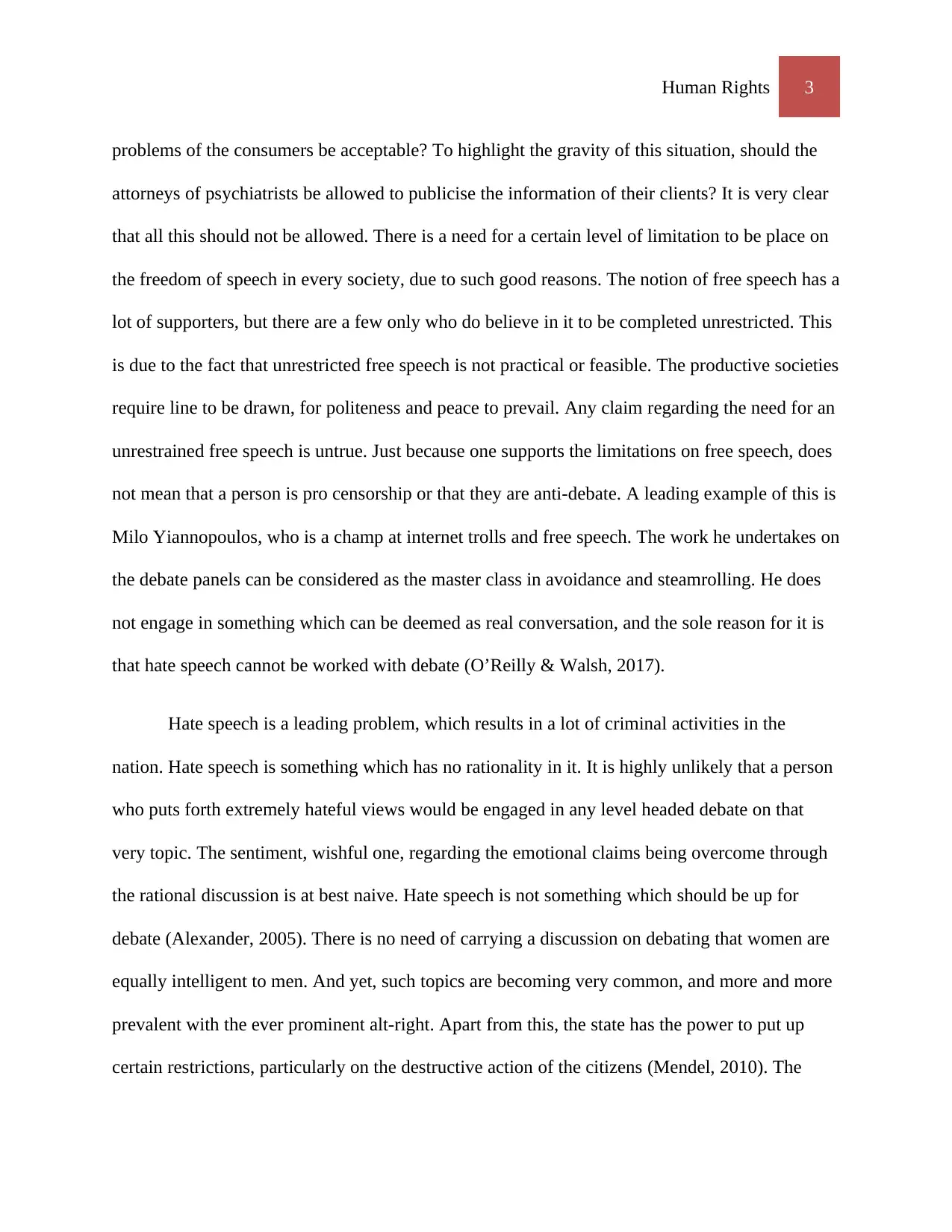
Human Rights 3
problems of the consumers be acceptable? To highlight the gravity of this situation, should the
attorneys of psychiatrists be allowed to publicise the information of their clients? It is very clear
that all this should not be allowed. There is a need for a certain level of limitation to be place on
the freedom of speech in every society, due to such good reasons. The notion of free speech has a
lot of supporters, but there are a few only who do believe in it to be completed unrestricted. This
is due to the fact that unrestricted free speech is not practical or feasible. The productive societies
require line to be drawn, for politeness and peace to prevail. Any claim regarding the need for an
unrestrained free speech is untrue. Just because one supports the limitations on free speech, does
not mean that a person is pro censorship or that they are anti-debate. A leading example of this is
Milo Yiannopoulos, who is a champ at internet trolls and free speech. The work he undertakes on
the debate panels can be considered as the master class in avoidance and steamrolling. He does
not engage in something which can be deemed as real conversation, and the sole reason for it is
that hate speech cannot be worked with debate (O’Reilly & Walsh, 2017).
Hate speech is a leading problem, which results in a lot of criminal activities in the
nation. Hate speech is something which has no rationality in it. It is highly unlikely that a person
who puts forth extremely hateful views would be engaged in any level headed debate on that
very topic. The sentiment, wishful one, regarding the emotional claims being overcome through
the rational discussion is at best naive. Hate speech is not something which should be up for
debate (Alexander, 2005). There is no need of carrying a discussion on debating that women are
equally intelligent to men. And yet, such topics are becoming very common, and more and more
prevalent with the ever prominent alt-right. Apart from this, the state has the power to put up
certain restrictions, particularly on the destructive action of the citizens (Mendel, 2010). The
problems of the consumers be acceptable? To highlight the gravity of this situation, should the
attorneys of psychiatrists be allowed to publicise the information of their clients? It is very clear
that all this should not be allowed. There is a need for a certain level of limitation to be place on
the freedom of speech in every society, due to such good reasons. The notion of free speech has a
lot of supporters, but there are a few only who do believe in it to be completed unrestricted. This
is due to the fact that unrestricted free speech is not practical or feasible. The productive societies
require line to be drawn, for politeness and peace to prevail. Any claim regarding the need for an
unrestrained free speech is untrue. Just because one supports the limitations on free speech, does
not mean that a person is pro censorship or that they are anti-debate. A leading example of this is
Milo Yiannopoulos, who is a champ at internet trolls and free speech. The work he undertakes on
the debate panels can be considered as the master class in avoidance and steamrolling. He does
not engage in something which can be deemed as real conversation, and the sole reason for it is
that hate speech cannot be worked with debate (O’Reilly & Walsh, 2017).
Hate speech is a leading problem, which results in a lot of criminal activities in the
nation. Hate speech is something which has no rationality in it. It is highly unlikely that a person
who puts forth extremely hateful views would be engaged in any level headed debate on that
very topic. The sentiment, wishful one, regarding the emotional claims being overcome through
the rational discussion is at best naive. Hate speech is not something which should be up for
debate (Alexander, 2005). There is no need of carrying a discussion on debating that women are
equally intelligent to men. And yet, such topics are becoming very common, and more and more
prevalent with the ever prominent alt-right. Apart from this, the state has the power to put up
certain restrictions, particularly on the destructive action of the citizens (Mendel, 2010). The
⊘ This is a preview!⊘
Do you want full access?
Subscribe today to unlock all pages.

Trusted by 1+ million students worldwide
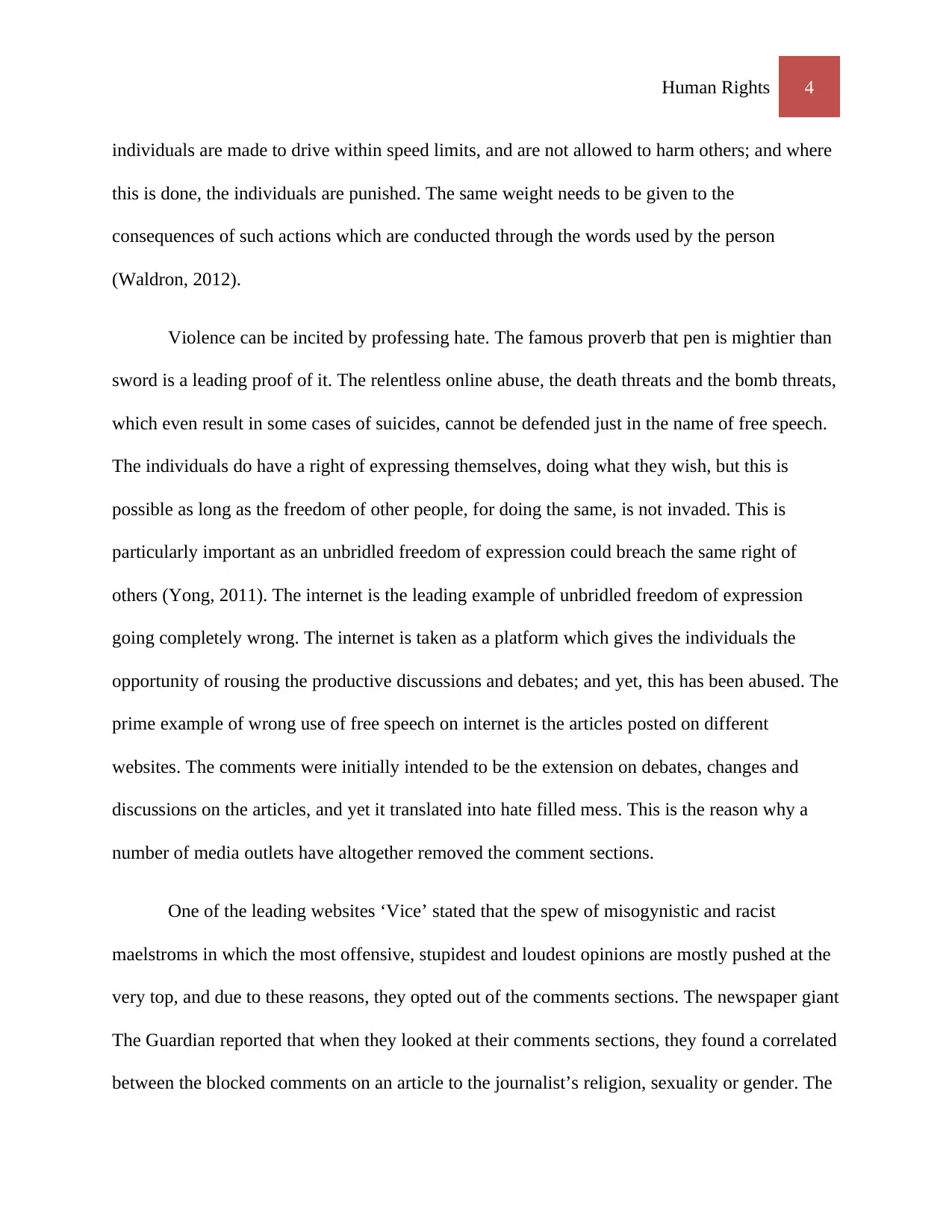
Human Rights 4
individuals are made to drive within speed limits, and are not allowed to harm others; and where
this is done, the individuals are punished. The same weight needs to be given to the
consequences of such actions which are conducted through the words used by the person
(Waldron, 2012).
Violence can be incited by professing hate. The famous proverb that pen is mightier than
sword is a leading proof of it. The relentless online abuse, the death threats and the bomb threats,
which even result in some cases of suicides, cannot be defended just in the name of free speech.
The individuals do have a right of expressing themselves, doing what they wish, but this is
possible as long as the freedom of other people, for doing the same, is not invaded. This is
particularly important as an unbridled freedom of expression could breach the same right of
others (Yong, 2011). The internet is the leading example of unbridled freedom of expression
going completely wrong. The internet is taken as a platform which gives the individuals the
opportunity of rousing the productive discussions and debates; and yet, this has been abused. The
prime example of wrong use of free speech on internet is the articles posted on different
websites. The comments were initially intended to be the extension on debates, changes and
discussions on the articles, and yet it translated into hate filled mess. This is the reason why a
number of media outlets have altogether removed the comment sections.
One of the leading websites ‘Vice’ stated that the spew of misogynistic and racist
maelstroms in which the most offensive, stupidest and loudest opinions are mostly pushed at the
very top, and due to these reasons, they opted out of the comments sections. The newspaper giant
The Guardian reported that when they looked at their comments sections, they found a correlated
between the blocked comments on an article to the journalist’s religion, sexuality or gender. The
individuals are made to drive within speed limits, and are not allowed to harm others; and where
this is done, the individuals are punished. The same weight needs to be given to the
consequences of such actions which are conducted through the words used by the person
(Waldron, 2012).
Violence can be incited by professing hate. The famous proverb that pen is mightier than
sword is a leading proof of it. The relentless online abuse, the death threats and the bomb threats,
which even result in some cases of suicides, cannot be defended just in the name of free speech.
The individuals do have a right of expressing themselves, doing what they wish, but this is
possible as long as the freedom of other people, for doing the same, is not invaded. This is
particularly important as an unbridled freedom of expression could breach the same right of
others (Yong, 2011). The internet is the leading example of unbridled freedom of expression
going completely wrong. The internet is taken as a platform which gives the individuals the
opportunity of rousing the productive discussions and debates; and yet, this has been abused. The
prime example of wrong use of free speech on internet is the articles posted on different
websites. The comments were initially intended to be the extension on debates, changes and
discussions on the articles, and yet it translated into hate filled mess. This is the reason why a
number of media outlets have altogether removed the comment sections.
One of the leading websites ‘Vice’ stated that the spew of misogynistic and racist
maelstroms in which the most offensive, stupidest and loudest opinions are mostly pushed at the
very top, and due to these reasons, they opted out of the comments sections. The newspaper giant
The Guardian reported that when they looked at their comments sections, they found a correlated
between the blocked comments on an article to the journalist’s religion, sexuality or gender. The
Paraphrase This Document
Need a fresh take? Get an instant paraphrase of this document with our AI Paraphraser
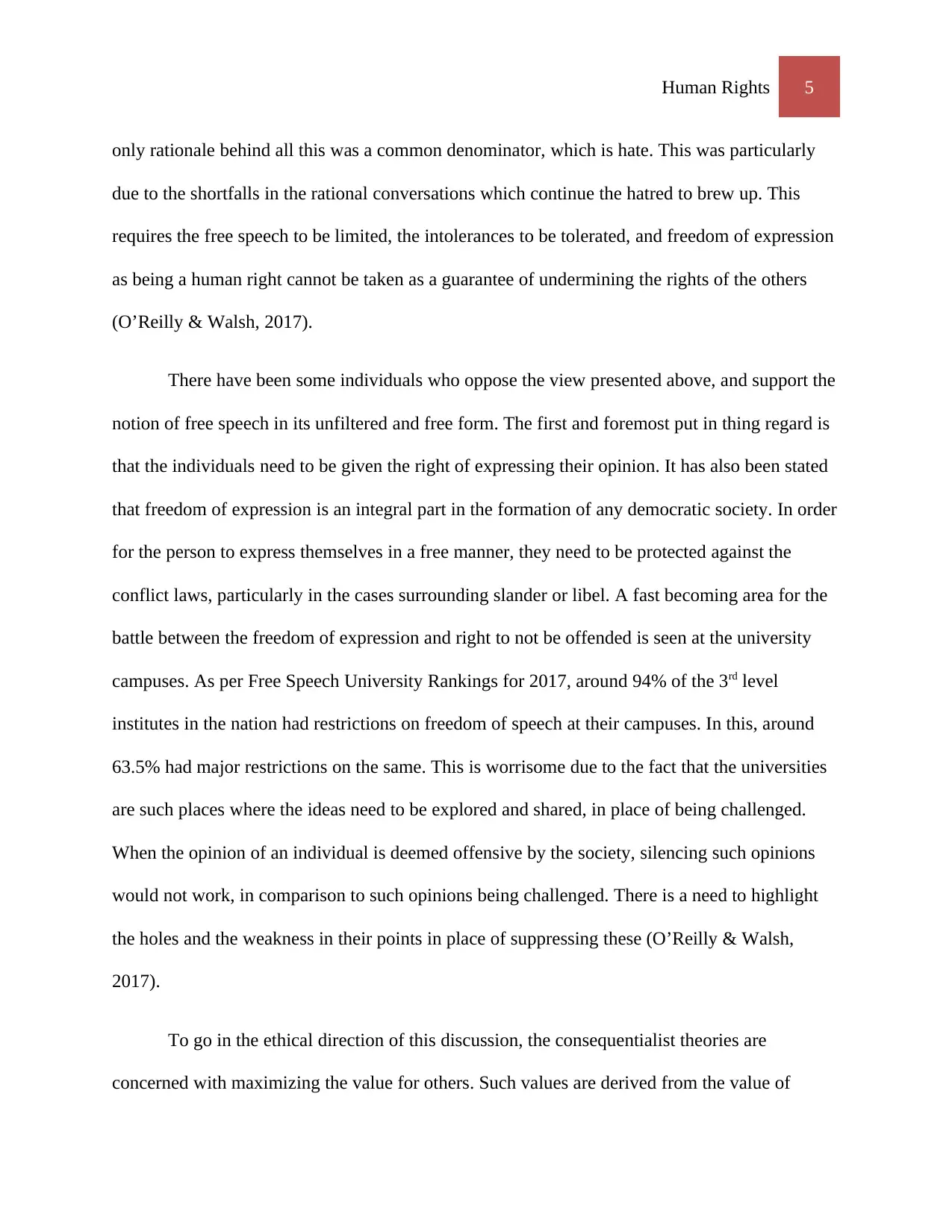
Human Rights 5
only rationale behind all this was a common denominator, which is hate. This was particularly
due to the shortfalls in the rational conversations which continue the hatred to brew up. This
requires the free speech to be limited, the intolerances to be tolerated, and freedom of expression
as being a human right cannot be taken as a guarantee of undermining the rights of the others
(O’Reilly & Walsh, 2017).
There have been some individuals who oppose the view presented above, and support the
notion of free speech in its unfiltered and free form. The first and foremost put in thing regard is
that the individuals need to be given the right of expressing their opinion. It has also been stated
that freedom of expression is an integral part in the formation of any democratic society. In order
for the person to express themselves in a free manner, they need to be protected against the
conflict laws, particularly in the cases surrounding slander or libel. A fast becoming area for the
battle between the freedom of expression and right to not be offended is seen at the university
campuses. As per Free Speech University Rankings for 2017, around 94% of the 3rd level
institutes in the nation had restrictions on freedom of speech at their campuses. In this, around
63.5% had major restrictions on the same. This is worrisome due to the fact that the universities
are such places where the ideas need to be explored and shared, in place of being challenged.
When the opinion of an individual is deemed offensive by the society, silencing such opinions
would not work, in comparison to such opinions being challenged. There is a need to highlight
the holes and the weakness in their points in place of suppressing these (O’Reilly & Walsh,
2017).
To go in the ethical direction of this discussion, the consequentialist theories are
concerned with maximizing the value for others. Such values are derived from the value of
only rationale behind all this was a common denominator, which is hate. This was particularly
due to the shortfalls in the rational conversations which continue the hatred to brew up. This
requires the free speech to be limited, the intolerances to be tolerated, and freedom of expression
as being a human right cannot be taken as a guarantee of undermining the rights of the others
(O’Reilly & Walsh, 2017).
There have been some individuals who oppose the view presented above, and support the
notion of free speech in its unfiltered and free form. The first and foremost put in thing regard is
that the individuals need to be given the right of expressing their opinion. It has also been stated
that freedom of expression is an integral part in the formation of any democratic society. In order
for the person to express themselves in a free manner, they need to be protected against the
conflict laws, particularly in the cases surrounding slander or libel. A fast becoming area for the
battle between the freedom of expression and right to not be offended is seen at the university
campuses. As per Free Speech University Rankings for 2017, around 94% of the 3rd level
institutes in the nation had restrictions on freedom of speech at their campuses. In this, around
63.5% had major restrictions on the same. This is worrisome due to the fact that the universities
are such places where the ideas need to be explored and shared, in place of being challenged.
When the opinion of an individual is deemed offensive by the society, silencing such opinions
would not work, in comparison to such opinions being challenged. There is a need to highlight
the holes and the weakness in their points in place of suppressing these (O’Reilly & Walsh,
2017).
To go in the ethical direction of this discussion, the consequentialist theories are
concerned with maximizing the value for others. Such values are derived from the value of
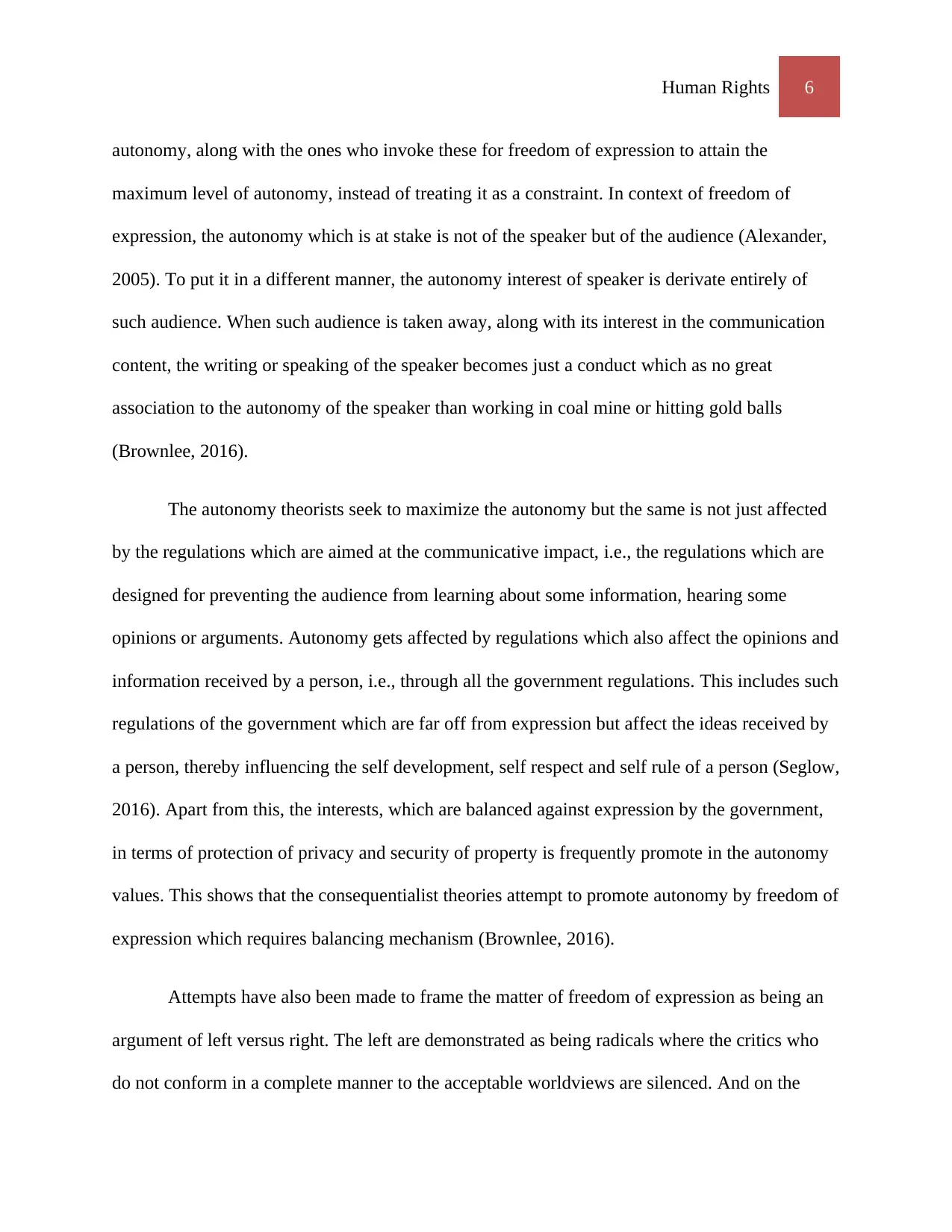
Human Rights 6
autonomy, along with the ones who invoke these for freedom of expression to attain the
maximum level of autonomy, instead of treating it as a constraint. In context of freedom of
expression, the autonomy which is at stake is not of the speaker but of the audience (Alexander,
2005). To put it in a different manner, the autonomy interest of speaker is derivate entirely of
such audience. When such audience is taken away, along with its interest in the communication
content, the writing or speaking of the speaker becomes just a conduct which as no great
association to the autonomy of the speaker than working in coal mine or hitting gold balls
(Brownlee, 2016).
The autonomy theorists seek to maximize the autonomy but the same is not just affected
by the regulations which are aimed at the communicative impact, i.e., the regulations which are
designed for preventing the audience from learning about some information, hearing some
opinions or arguments. Autonomy gets affected by regulations which also affect the opinions and
information received by a person, i.e., through all the government regulations. This includes such
regulations of the government which are far off from expression but affect the ideas received by
a person, thereby influencing the self development, self respect and self rule of a person (Seglow,
2016). Apart from this, the interests, which are balanced against expression by the government,
in terms of protection of privacy and security of property is frequently promote in the autonomy
values. This shows that the consequentialist theories attempt to promote autonomy by freedom of
expression which requires balancing mechanism (Brownlee, 2016).
Attempts have also been made to frame the matter of freedom of expression as being an
argument of left versus right. The left are demonstrated as being radicals where the critics who
do not conform in a complete manner to the acceptable worldviews are silenced. And on the
autonomy, along with the ones who invoke these for freedom of expression to attain the
maximum level of autonomy, instead of treating it as a constraint. In context of freedom of
expression, the autonomy which is at stake is not of the speaker but of the audience (Alexander,
2005). To put it in a different manner, the autonomy interest of speaker is derivate entirely of
such audience. When such audience is taken away, along with its interest in the communication
content, the writing or speaking of the speaker becomes just a conduct which as no great
association to the autonomy of the speaker than working in coal mine or hitting gold balls
(Brownlee, 2016).
The autonomy theorists seek to maximize the autonomy but the same is not just affected
by the regulations which are aimed at the communicative impact, i.e., the regulations which are
designed for preventing the audience from learning about some information, hearing some
opinions or arguments. Autonomy gets affected by regulations which also affect the opinions and
information received by a person, i.e., through all the government regulations. This includes such
regulations of the government which are far off from expression but affect the ideas received by
a person, thereby influencing the self development, self respect and self rule of a person (Seglow,
2016). Apart from this, the interests, which are balanced against expression by the government,
in terms of protection of privacy and security of property is frequently promote in the autonomy
values. This shows that the consequentialist theories attempt to promote autonomy by freedom of
expression which requires balancing mechanism (Brownlee, 2016).
Attempts have also been made to frame the matter of freedom of expression as being an
argument of left versus right. The left are demonstrated as being radicals where the critics who
do not conform in a complete manner to the acceptable worldviews are silenced. And on the
⊘ This is a preview!⊘
Do you want full access?
Subscribe today to unlock all pages.

Trusted by 1+ million students worldwide
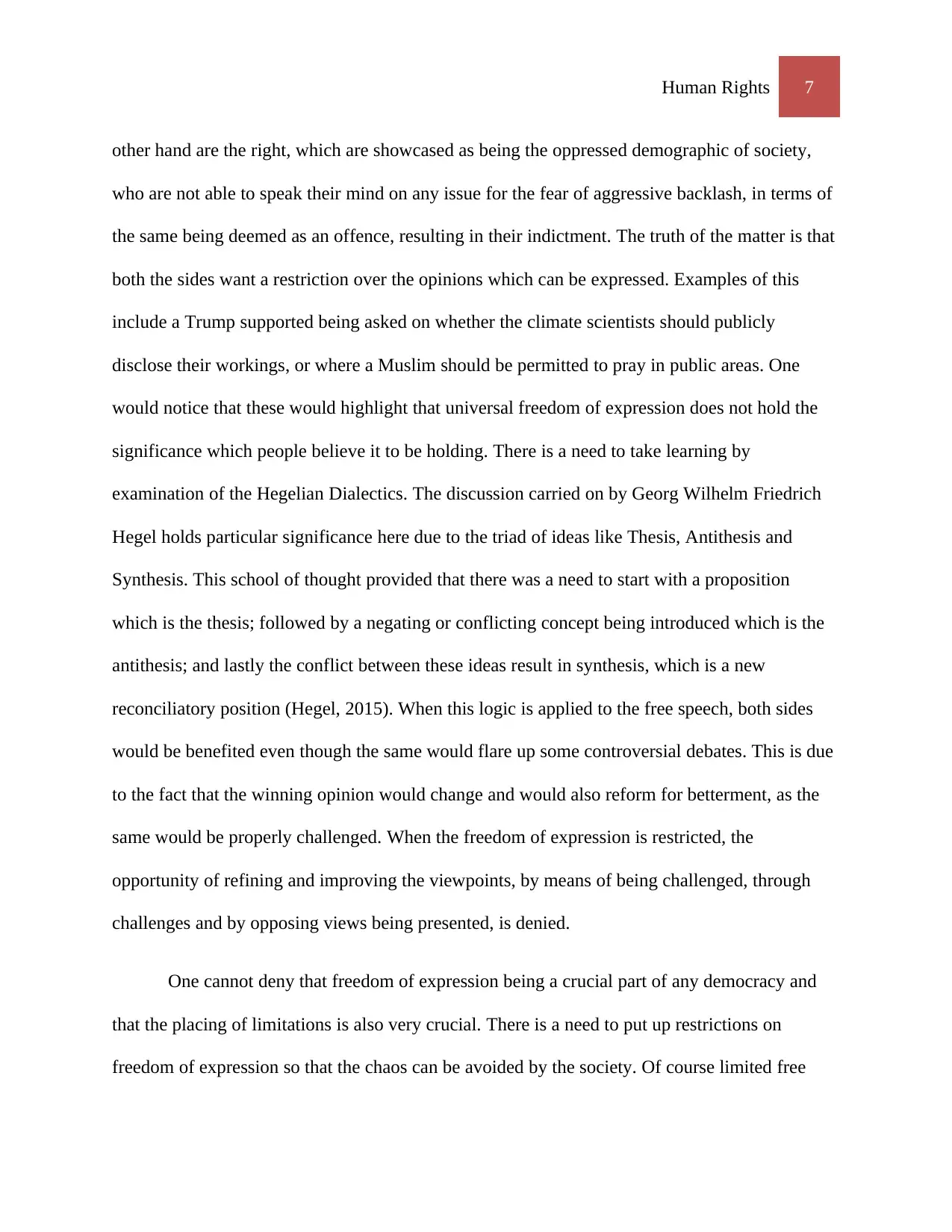
Human Rights 7
other hand are the right, which are showcased as being the oppressed demographic of society,
who are not able to speak their mind on any issue for the fear of aggressive backlash, in terms of
the same being deemed as an offence, resulting in their indictment. The truth of the matter is that
both the sides want a restriction over the opinions which can be expressed. Examples of this
include a Trump supported being asked on whether the climate scientists should publicly
disclose their workings, or where a Muslim should be permitted to pray in public areas. One
would notice that these would highlight that universal freedom of expression does not hold the
significance which people believe it to be holding. There is a need to take learning by
examination of the Hegelian Dialectics. The discussion carried on by Georg Wilhelm Friedrich
Hegel holds particular significance here due to the triad of ideas like Thesis, Antithesis and
Synthesis. This school of thought provided that there was a need to start with a proposition
which is the thesis; followed by a negating or conflicting concept being introduced which is the
antithesis; and lastly the conflict between these ideas result in synthesis, which is a new
reconciliatory position (Hegel, 2015). When this logic is applied to the free speech, both sides
would be benefited even though the same would flare up some controversial debates. This is due
to the fact that the winning opinion would change and would also reform for betterment, as the
same would be properly challenged. When the freedom of expression is restricted, the
opportunity of refining and improving the viewpoints, by means of being challenged, through
challenges and by opposing views being presented, is denied.
One cannot deny that freedom of expression being a crucial part of any democracy and
that the placing of limitations is also very crucial. There is a need to put up restrictions on
freedom of expression so that the chaos can be avoided by the society. Of course limited free
other hand are the right, which are showcased as being the oppressed demographic of society,
who are not able to speak their mind on any issue for the fear of aggressive backlash, in terms of
the same being deemed as an offence, resulting in their indictment. The truth of the matter is that
both the sides want a restriction over the opinions which can be expressed. Examples of this
include a Trump supported being asked on whether the climate scientists should publicly
disclose their workings, or where a Muslim should be permitted to pray in public areas. One
would notice that these would highlight that universal freedom of expression does not hold the
significance which people believe it to be holding. There is a need to take learning by
examination of the Hegelian Dialectics. The discussion carried on by Georg Wilhelm Friedrich
Hegel holds particular significance here due to the triad of ideas like Thesis, Antithesis and
Synthesis. This school of thought provided that there was a need to start with a proposition
which is the thesis; followed by a negating or conflicting concept being introduced which is the
antithesis; and lastly the conflict between these ideas result in synthesis, which is a new
reconciliatory position (Hegel, 2015). When this logic is applied to the free speech, both sides
would be benefited even though the same would flare up some controversial debates. This is due
to the fact that the winning opinion would change and would also reform for betterment, as the
same would be properly challenged. When the freedom of expression is restricted, the
opportunity of refining and improving the viewpoints, by means of being challenged, through
challenges and by opposing views being presented, is denied.
One cannot deny that freedom of expression being a crucial part of any democracy and
that the placing of limitations is also very crucial. There is a need to put up restrictions on
freedom of expression so that the chaos can be avoided by the society. Of course limited free
Paraphrase This Document
Need a fresh take? Get an instant paraphrase of this document with our AI Paraphraser
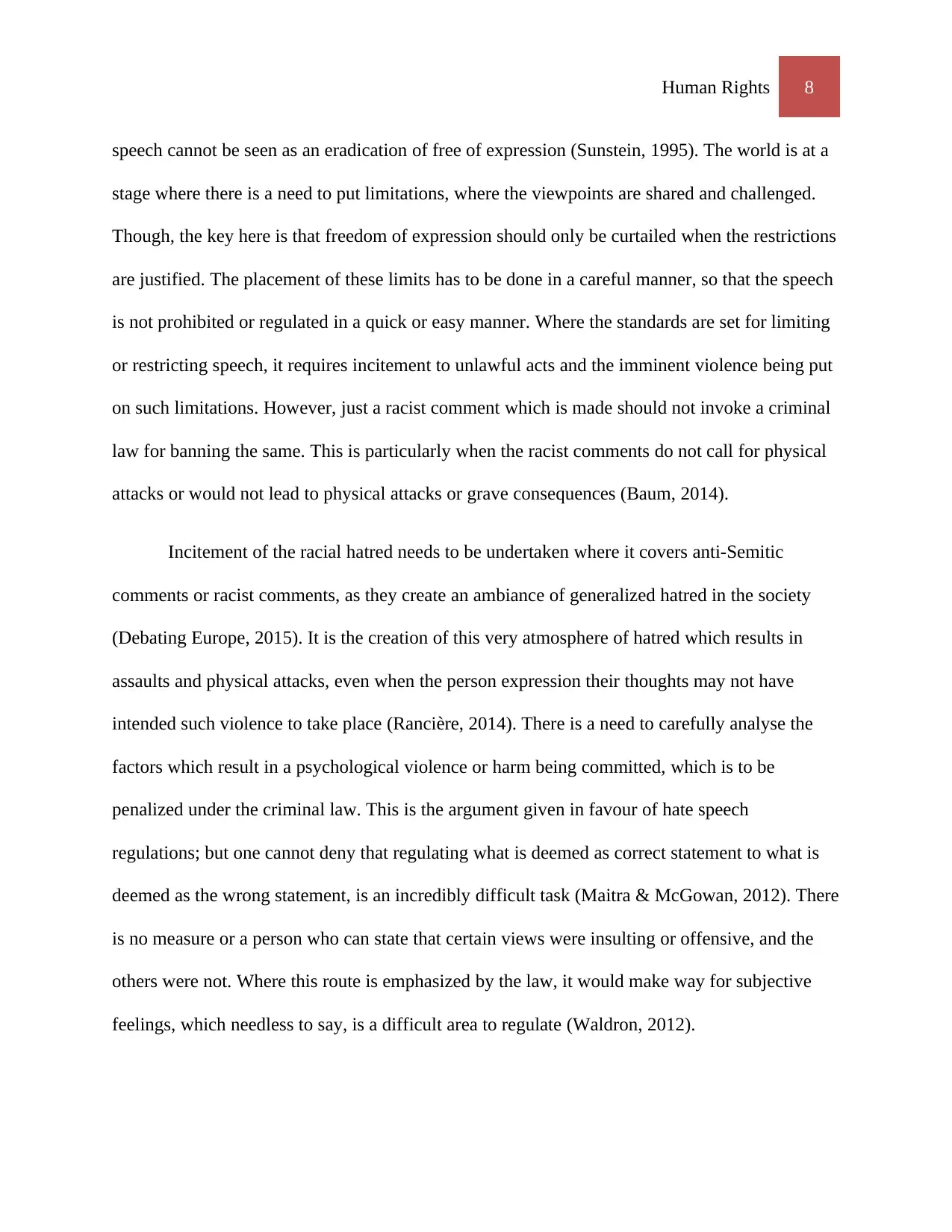
Human Rights 8
speech cannot be seen as an eradication of free of expression (Sunstein, 1995). The world is at a
stage where there is a need to put limitations, where the viewpoints are shared and challenged.
Though, the key here is that freedom of expression should only be curtailed when the restrictions
are justified. The placement of these limits has to be done in a careful manner, so that the speech
is not prohibited or regulated in a quick or easy manner. Where the standards are set for limiting
or restricting speech, it requires incitement to unlawful acts and the imminent violence being put
on such limitations. However, just a racist comment which is made should not invoke a criminal
law for banning the same. This is particularly when the racist comments do not call for physical
attacks or would not lead to physical attacks or grave consequences (Baum, 2014).
Incitement of the racial hatred needs to be undertaken where it covers anti-Semitic
comments or racist comments, as they create an ambiance of generalized hatred in the society
(Debating Europe, 2015). It is the creation of this very atmosphere of hatred which results in
assaults and physical attacks, even when the person expression their thoughts may not have
intended such violence to take place (Rancière, 2014). There is a need to carefully analyse the
factors which result in a psychological violence or harm being committed, which is to be
penalized under the criminal law. This is the argument given in favour of hate speech
regulations; but one cannot deny that regulating what is deemed as correct statement to what is
deemed as the wrong statement, is an incredibly difficult task (Maitra & McGowan, 2012). There
is no measure or a person who can state that certain views were insulting or offensive, and the
others were not. Where this route is emphasized by the law, it would make way for subjective
feelings, which needless to say, is a difficult area to regulate (Waldron, 2012).
speech cannot be seen as an eradication of free of expression (Sunstein, 1995). The world is at a
stage where there is a need to put limitations, where the viewpoints are shared and challenged.
Though, the key here is that freedom of expression should only be curtailed when the restrictions
are justified. The placement of these limits has to be done in a careful manner, so that the speech
is not prohibited or regulated in a quick or easy manner. Where the standards are set for limiting
or restricting speech, it requires incitement to unlawful acts and the imminent violence being put
on such limitations. However, just a racist comment which is made should not invoke a criminal
law for banning the same. This is particularly when the racist comments do not call for physical
attacks or would not lead to physical attacks or grave consequences (Baum, 2014).
Incitement of the racial hatred needs to be undertaken where it covers anti-Semitic
comments or racist comments, as they create an ambiance of generalized hatred in the society
(Debating Europe, 2015). It is the creation of this very atmosphere of hatred which results in
assaults and physical attacks, even when the person expression their thoughts may not have
intended such violence to take place (Rancière, 2014). There is a need to carefully analyse the
factors which result in a psychological violence or harm being committed, which is to be
penalized under the criminal law. This is the argument given in favour of hate speech
regulations; but one cannot deny that regulating what is deemed as correct statement to what is
deemed as the wrong statement, is an incredibly difficult task (Maitra & McGowan, 2012). There
is no measure or a person who can state that certain views were insulting or offensive, and the
others were not. Where this route is emphasized by the law, it would make way for subjective
feelings, which needless to say, is a difficult area to regulate (Waldron, 2012).
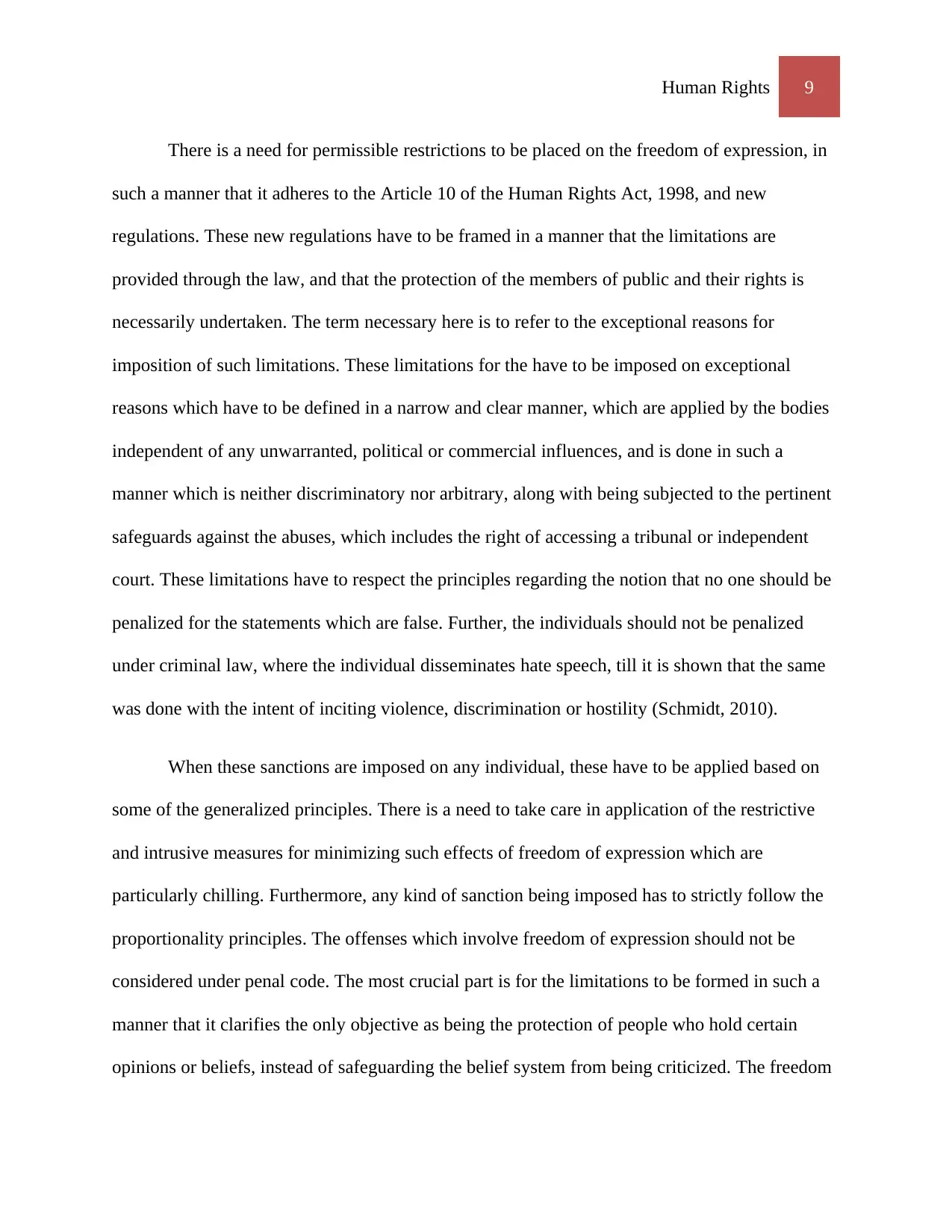
Human Rights 9
There is a need for permissible restrictions to be placed on the freedom of expression, in
such a manner that it adheres to the Article 10 of the Human Rights Act, 1998, and new
regulations. These new regulations have to be framed in a manner that the limitations are
provided through the law, and that the protection of the members of public and their rights is
necessarily undertaken. The term necessary here is to refer to the exceptional reasons for
imposition of such limitations. These limitations for the have to be imposed on exceptional
reasons which have to be defined in a narrow and clear manner, which are applied by the bodies
independent of any unwarranted, political or commercial influences, and is done in such a
manner which is neither discriminatory nor arbitrary, along with being subjected to the pertinent
safeguards against the abuses, which includes the right of accessing a tribunal or independent
court. These limitations have to respect the principles regarding the notion that no one should be
penalized for the statements which are false. Further, the individuals should not be penalized
under criminal law, where the individual disseminates hate speech, till it is shown that the same
was done with the intent of inciting violence, discrimination or hostility (Schmidt, 2010).
When these sanctions are imposed on any individual, these have to be applied based on
some of the generalized principles. There is a need to take care in application of the restrictive
and intrusive measures for minimizing such effects of freedom of expression which are
particularly chilling. Furthermore, any kind of sanction being imposed has to strictly follow the
proportionality principles. The offenses which involve freedom of expression should not be
considered under penal code. The most crucial part is for the limitations to be formed in such a
manner that it clarifies the only objective as being the protection of people who hold certain
opinions or beliefs, instead of safeguarding the belief system from being criticized. The freedom
There is a need for permissible restrictions to be placed on the freedom of expression, in
such a manner that it adheres to the Article 10 of the Human Rights Act, 1998, and new
regulations. These new regulations have to be framed in a manner that the limitations are
provided through the law, and that the protection of the members of public and their rights is
necessarily undertaken. The term necessary here is to refer to the exceptional reasons for
imposition of such limitations. These limitations for the have to be imposed on exceptional
reasons which have to be defined in a narrow and clear manner, which are applied by the bodies
independent of any unwarranted, political or commercial influences, and is done in such a
manner which is neither discriminatory nor arbitrary, along with being subjected to the pertinent
safeguards against the abuses, which includes the right of accessing a tribunal or independent
court. These limitations have to respect the principles regarding the notion that no one should be
penalized for the statements which are false. Further, the individuals should not be penalized
under criminal law, where the individual disseminates hate speech, till it is shown that the same
was done with the intent of inciting violence, discrimination or hostility (Schmidt, 2010).
When these sanctions are imposed on any individual, these have to be applied based on
some of the generalized principles. There is a need to take care in application of the restrictive
and intrusive measures for minimizing such effects of freedom of expression which are
particularly chilling. Furthermore, any kind of sanction being imposed has to strictly follow the
proportionality principles. The offenses which involve freedom of expression should not be
considered under penal code. The most crucial part is for the limitations to be formed in such a
manner that it clarifies the only objective as being the protection of people who hold certain
opinions or beliefs, instead of safeguarding the belief system from being criticized. The freedom
⊘ This is a preview!⊘
Do you want full access?
Subscribe today to unlock all pages.

Trusted by 1+ million students worldwide
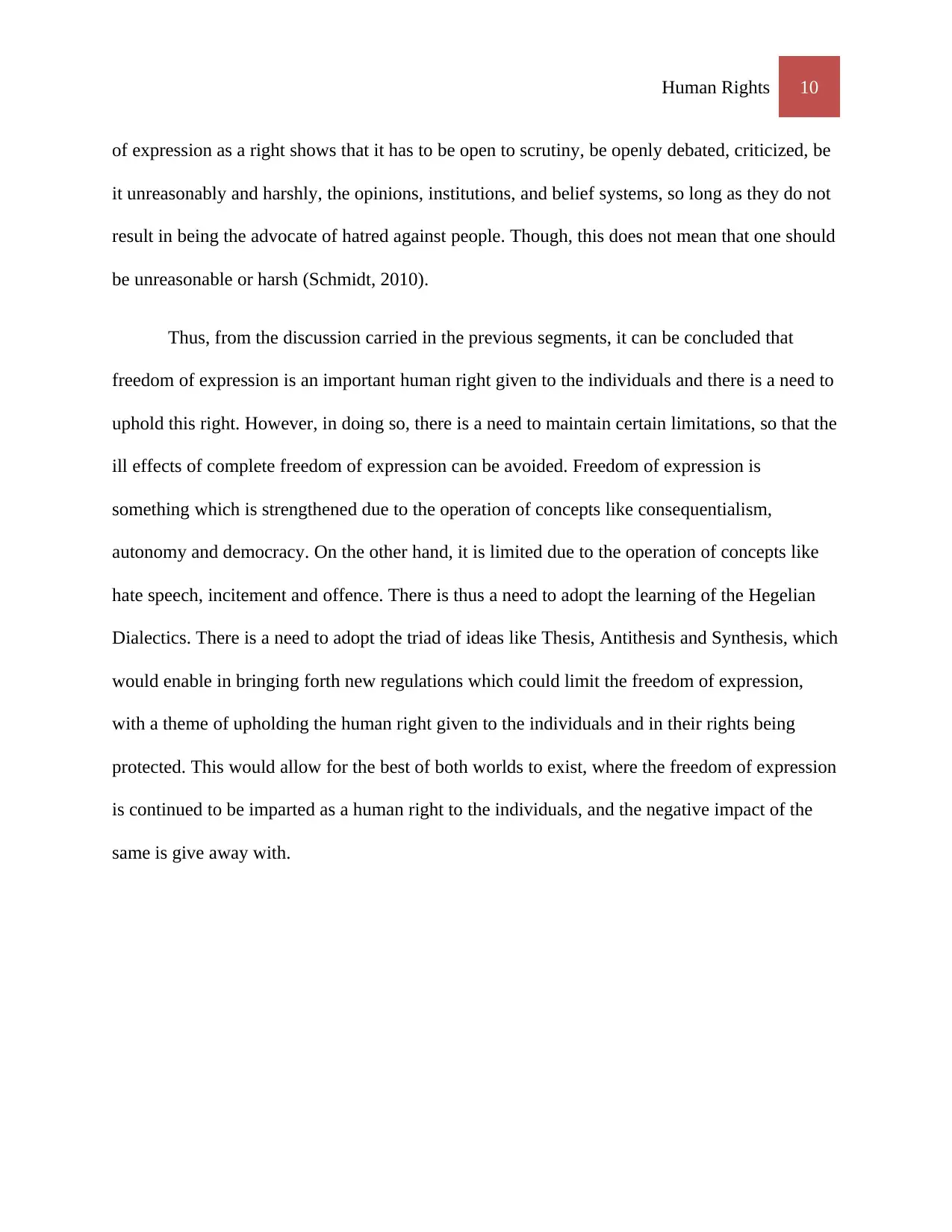
Human Rights 10
of expression as a right shows that it has to be open to scrutiny, be openly debated, criticized, be
it unreasonably and harshly, the opinions, institutions, and belief systems, so long as they do not
result in being the advocate of hatred against people. Though, this does not mean that one should
be unreasonable or harsh (Schmidt, 2010).
Thus, from the discussion carried in the previous segments, it can be concluded that
freedom of expression is an important human right given to the individuals and there is a need to
uphold this right. However, in doing so, there is a need to maintain certain limitations, so that the
ill effects of complete freedom of expression can be avoided. Freedom of expression is
something which is strengthened due to the operation of concepts like consequentialism,
autonomy and democracy. On the other hand, it is limited due to the operation of concepts like
hate speech, incitement and offence. There is thus a need to adopt the learning of the Hegelian
Dialectics. There is a need to adopt the triad of ideas like Thesis, Antithesis and Synthesis, which
would enable in bringing forth new regulations which could limit the freedom of expression,
with a theme of upholding the human right given to the individuals and in their rights being
protected. This would allow for the best of both worlds to exist, where the freedom of expression
is continued to be imparted as a human right to the individuals, and the negative impact of the
same is give away with.
of expression as a right shows that it has to be open to scrutiny, be openly debated, criticized, be
it unreasonably and harshly, the opinions, institutions, and belief systems, so long as they do not
result in being the advocate of hatred against people. Though, this does not mean that one should
be unreasonable or harsh (Schmidt, 2010).
Thus, from the discussion carried in the previous segments, it can be concluded that
freedom of expression is an important human right given to the individuals and there is a need to
uphold this right. However, in doing so, there is a need to maintain certain limitations, so that the
ill effects of complete freedom of expression can be avoided. Freedom of expression is
something which is strengthened due to the operation of concepts like consequentialism,
autonomy and democracy. On the other hand, it is limited due to the operation of concepts like
hate speech, incitement and offence. There is thus a need to adopt the learning of the Hegelian
Dialectics. There is a need to adopt the triad of ideas like Thesis, Antithesis and Synthesis, which
would enable in bringing forth new regulations which could limit the freedom of expression,
with a theme of upholding the human right given to the individuals and in their rights being
protected. This would allow for the best of both worlds to exist, where the freedom of expression
is continued to be imparted as a human right to the individuals, and the negative impact of the
same is give away with.
Paraphrase This Document
Need a fresh take? Get an instant paraphrase of this document with our AI Paraphraser
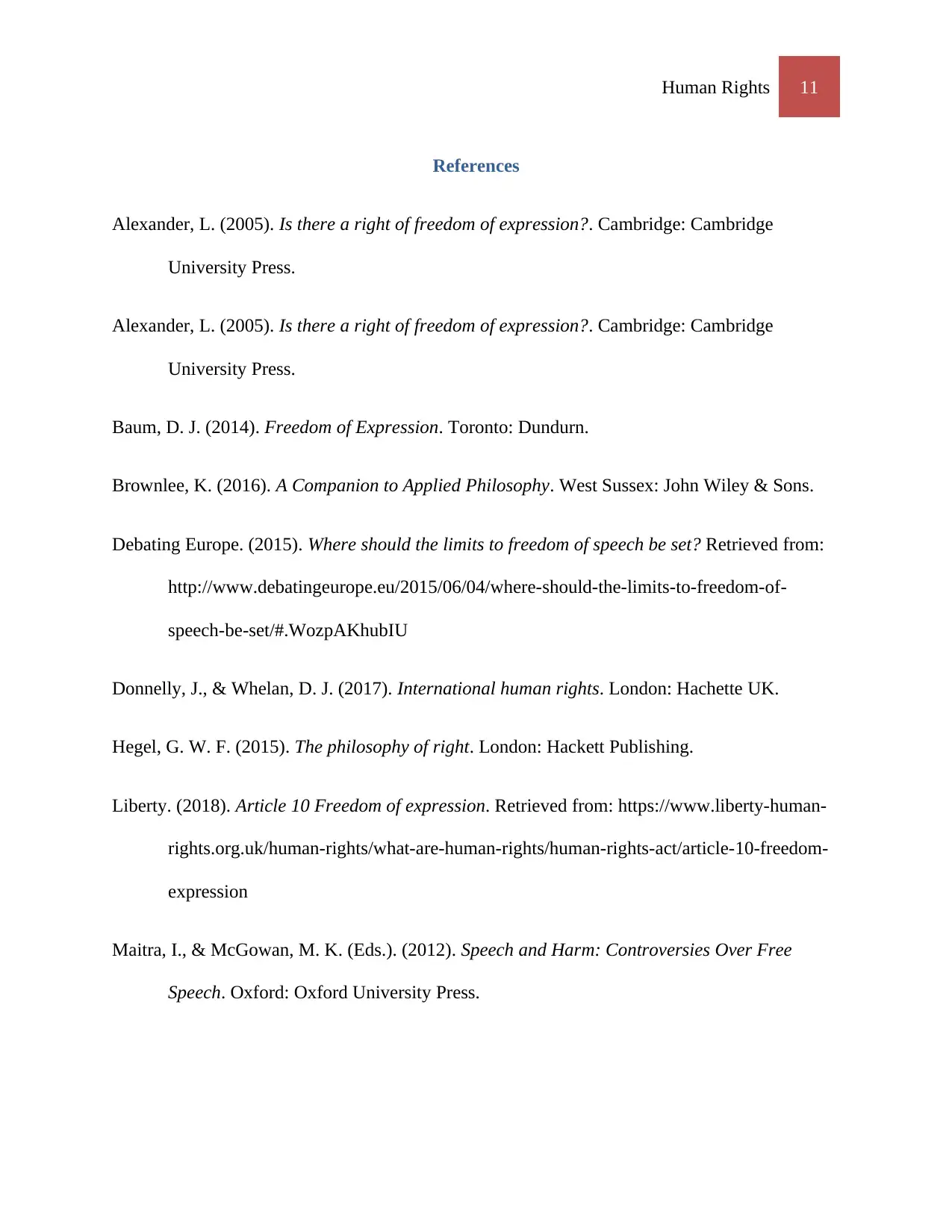
Human Rights 11
References
Alexander, L. (2005). Is there a right of freedom of expression?. Cambridge: Cambridge
University Press.
Alexander, L. (2005). Is there a right of freedom of expression?. Cambridge: Cambridge
University Press.
Baum, D. J. (2014). Freedom of Expression. Toronto: Dundurn.
Brownlee, K. (2016). A Companion to Applied Philosophy. West Sussex: John Wiley & Sons.
Debating Europe. (2015). Where should the limits to freedom of speech be set? Retrieved from:
http://www.debatingeurope.eu/2015/06/04/where-should-the-limits-to-freedom-of-
speech-be-set/#.WozpAKhubIU
Donnelly, J., & Whelan, D. J. (2017). International human rights. London: Hachette UK.
Hegel, G. W. F. (2015). The philosophy of right. London: Hackett Publishing.
Liberty. (2018). Article 10 Freedom of expression. Retrieved from: https://www.liberty-human-
rights.org.uk/human-rights/what-are-human-rights/human-rights-act/article-10-freedom-
expression
Maitra, I., & McGowan, M. K. (Eds.). (2012). Speech and Harm: Controversies Over Free
Speech. Oxford: Oxford University Press.
References
Alexander, L. (2005). Is there a right of freedom of expression?. Cambridge: Cambridge
University Press.
Alexander, L. (2005). Is there a right of freedom of expression?. Cambridge: Cambridge
University Press.
Baum, D. J. (2014). Freedom of Expression. Toronto: Dundurn.
Brownlee, K. (2016). A Companion to Applied Philosophy. West Sussex: John Wiley & Sons.
Debating Europe. (2015). Where should the limits to freedom of speech be set? Retrieved from:
http://www.debatingeurope.eu/2015/06/04/where-should-the-limits-to-freedom-of-
speech-be-set/#.WozpAKhubIU
Donnelly, J., & Whelan, D. J. (2017). International human rights. London: Hachette UK.
Hegel, G. W. F. (2015). The philosophy of right. London: Hackett Publishing.
Liberty. (2018). Article 10 Freedom of expression. Retrieved from: https://www.liberty-human-
rights.org.uk/human-rights/what-are-human-rights/human-rights-act/article-10-freedom-
expression
Maitra, I., & McGowan, M. K. (Eds.). (2012). Speech and Harm: Controversies Over Free
Speech. Oxford: Oxford University Press.
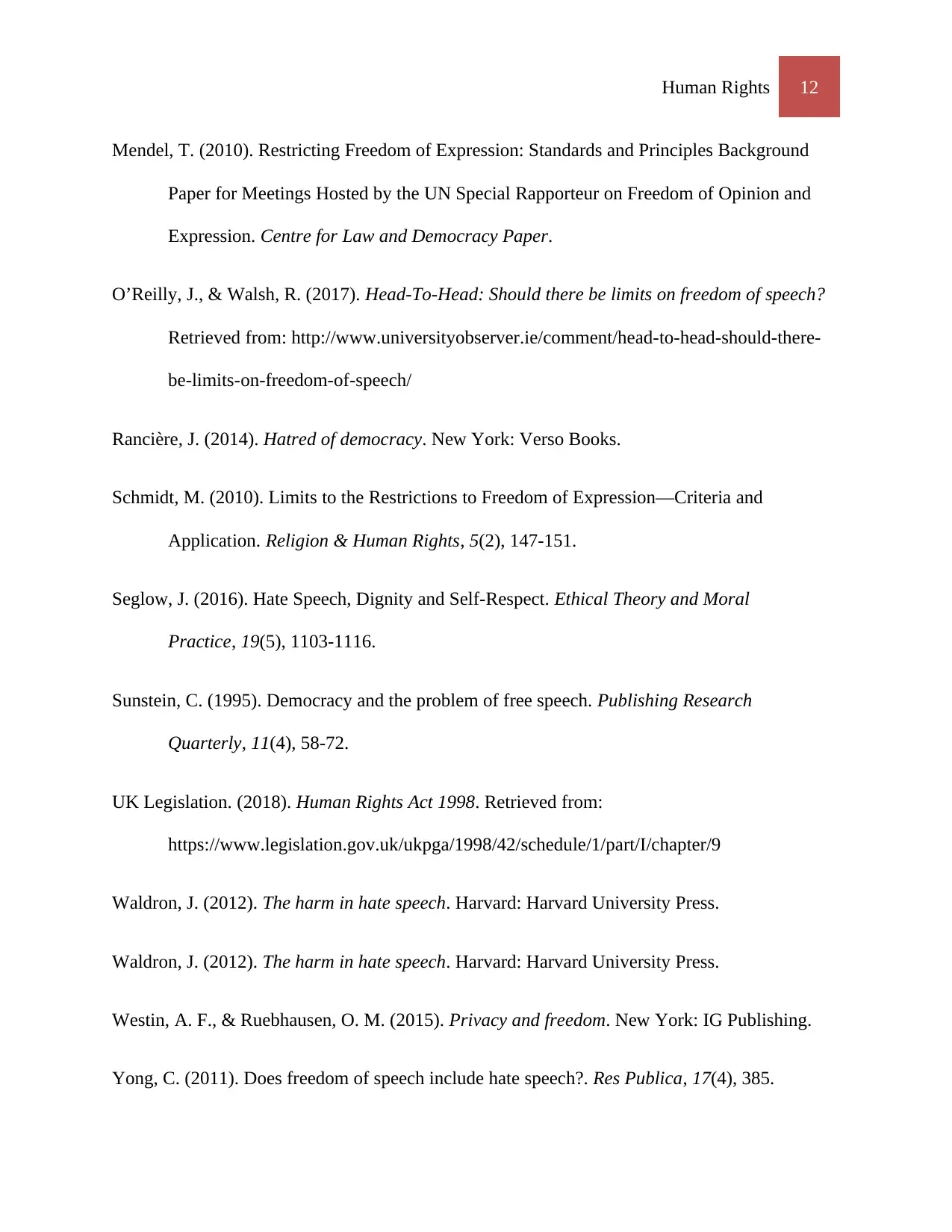
Human Rights 12
Mendel, T. (2010). Restricting Freedom of Expression: Standards and Principles Background
Paper for Meetings Hosted by the UN Special Rapporteur on Freedom of Opinion and
Expression. Centre for Law and Democracy Paper.
O’Reilly, J., & Walsh, R. (2017). Head-To-Head: Should there be limits on freedom of speech?
Retrieved from: http://www.universityobserver.ie/comment/head-to-head-should-there-
be-limits-on-freedom-of-speech/
Rancière, J. (2014). Hatred of democracy. New York: Verso Books.
Schmidt, M. (2010). Limits to the Restrictions to Freedom of Expression—Criteria and
Application. Religion & Human Rights, 5(2), 147-151.
Seglow, J. (2016). Hate Speech, Dignity and Self-Respect. Ethical Theory and Moral
Practice, 19(5), 1103-1116.
Sunstein, C. (1995). Democracy and the problem of free speech. Publishing Research
Quarterly, 11(4), 58-72.
UK Legislation. (2018). Human Rights Act 1998. Retrieved from:
https://www.legislation.gov.uk/ukpga/1998/42/schedule/1/part/I/chapter/9
Waldron, J. (2012). The harm in hate speech. Harvard: Harvard University Press.
Waldron, J. (2012). The harm in hate speech. Harvard: Harvard University Press.
Westin, A. F., & Ruebhausen, O. M. (2015). Privacy and freedom. New York: IG Publishing.
Yong, C. (2011). Does freedom of speech include hate speech?. Res Publica, 17(4), 385.
Mendel, T. (2010). Restricting Freedom of Expression: Standards and Principles Background
Paper for Meetings Hosted by the UN Special Rapporteur on Freedom of Opinion and
Expression. Centre for Law and Democracy Paper.
O’Reilly, J., & Walsh, R. (2017). Head-To-Head: Should there be limits on freedom of speech?
Retrieved from: http://www.universityobserver.ie/comment/head-to-head-should-there-
be-limits-on-freedom-of-speech/
Rancière, J. (2014). Hatred of democracy. New York: Verso Books.
Schmidt, M. (2010). Limits to the Restrictions to Freedom of Expression—Criteria and
Application. Religion & Human Rights, 5(2), 147-151.
Seglow, J. (2016). Hate Speech, Dignity and Self-Respect. Ethical Theory and Moral
Practice, 19(5), 1103-1116.
Sunstein, C. (1995). Democracy and the problem of free speech. Publishing Research
Quarterly, 11(4), 58-72.
UK Legislation. (2018). Human Rights Act 1998. Retrieved from:
https://www.legislation.gov.uk/ukpga/1998/42/schedule/1/part/I/chapter/9
Waldron, J. (2012). The harm in hate speech. Harvard: Harvard University Press.
Waldron, J. (2012). The harm in hate speech. Harvard: Harvard University Press.
Westin, A. F., & Ruebhausen, O. M. (2015). Privacy and freedom. New York: IG Publishing.
Yong, C. (2011). Does freedom of speech include hate speech?. Res Publica, 17(4), 385.
⊘ This is a preview!⊘
Do you want full access?
Subscribe today to unlock all pages.

Trusted by 1+ million students worldwide
1 out of 12
Related Documents
Your All-in-One AI-Powered Toolkit for Academic Success.
+13062052269
info@desklib.com
Available 24*7 on WhatsApp / Email
![[object Object]](/_next/static/media/star-bottom.7253800d.svg)
Unlock your academic potential
Copyright © 2020–2026 A2Z Services. All Rights Reserved. Developed and managed by ZUCOL.





